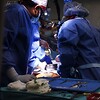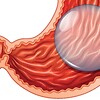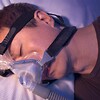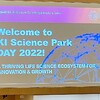Fritextsökning
Artiklar per år
Innehållstyper
-

ALS – When the body has given up, but the brain persists
The nerve disease ALS gradually deprives the patient of control over the muscles and, eventually, also of speech. The eyes continue to function, though, and with the help of, among other things, a Swedish-developed invention, communication with the outside world can continue. “It’s their window to the world,” says ALS researcher Caroline Ingre.
-

She creates pharmaceuticals on a 3D printer
The correct dosage for each individual, regardless of whether the pharmaceutical is for a seriously ill child or a frail elderly person, is the mission of a well-advanced project with 3D-printed drugs at Uppsala University. “It will soon be available in clinics”, says Christel Bergström, who is heading the project.
-

Karolinska rekryterar tidigare regiondirektör
-

The most important Swedish medical innovations: Our ranking
Life Science Sweden turns 20 years old – and celebrates by producing a top list of the 20 most important contemporary Swedish innovations in the field of medicine.
-

Viktigaste medicinska innovationerna plats 13-20
En metod som revolutionerade strålbehandlingen, ett förband som minskar risken för antibiotikaresistens och en teknik som hjälper bland andra ALS-patienter att kommunicera. Det är några av uppfinningarna som intar platserna 13-20 på Life Science Swedens rankning av de viktigaste svenska nutida innovationerna inom medicinområdet.
-

Här är hela listan – De viktigaste svenska medicininnovationerna
Högst upp på Life Science Swedens rankning över moderna svenska innovationer inom medicinområdet finns Losec från dåvarande Astra.
-

Neanderthal genes and Nobel Prize in a popular lecture at Bioscience
An inherited gene variant from our ”evolutionary cousins” – the extinct Neanderthals – may affect how our bodies break down certain drugs. “It’s only a matter of time before we actively start screening for it,” said KI researcher Hugo Zeberg when
-

"Are we doing business the wrong way around in the Life Science Sector?"
For the past 50 years we have created solutions for problems that we thought would solve the problems. Pharmaceuticals have created big block buster drugs which were great for that time but now we realise that these drugs were in fact only tested in white men and certainly not for patients who are older who are taking a number of medications.
-

FDA-kommitté förordar Astra Zenecas nya astmabehandling
En rådgivande kommitté till den amerikanska läkemedelsmyndigheten FDA rekommenderar Astra Zenecas preparat PT027 som en behandling mot astma för vuxna, uppger bolaget i ett pressmeddelande.
-

Alert from the Swedish Medicines Agency: Many complications with gastric balloons
According to the Swedish Medicines Agency, an increasing number of serious complications are being reported in procedures with gastric balloons as a method for weight loss. The authority fears significant shortcomings in the information to patients both before and after the procedure.
-

“We need to build flexible operating theatres”
Flexible operating theatres, micro-sensors on surgeons to monitor their well-being and 3D images projected onto organs to be operated on. These are a few ideas that three specialist surgeons are suggesting for the operating theatre of the future.
-

Avtal sluts mellan stora svenska och nederländska aktörer
Fyra överenskommelser mellan svenska och nederländska life science-aktörer ska skrivas idag. Avtalen signeras i samband med det pågående statsbesöket från Nederländerna under en ceremoni där ministrar från de bägge länderna medverkar.
-

Biosimilars bring price pressure, but are they sufficiently used?
When biosimilars were introduced just over 16 years ago, hopes were raised that they would give many more patients access to effective but otherwise extremely expensive treatments with biological drugs. So, how well has Swedish healthcare used biosimilars? The answer partly depends on whom you ask.
-

Bought a tablet factory – and built his own empire
In 1995, Thomas Eldered was CEO of one of Pharmacia’s factories in the Stockholm area when the Swedish pharmaceutical giant, after a takeover, decided to move its production abroad. 34-year-old Thomas was facing an imminent risk of losing his job. However, instead, it actually turned out to be the starting point for one of the biggest success stories in Swedish life science.
-

Marie Gårdmark: Potential step change – EU regulators get to play with data
A new pilot from EMA is starting in September to assess wether the analysis of 'raw data' by regulatory authorities improves the evaluation of marketing approval for new medicines. Marie Grådmark writes in a column that she is looking forward to the outcome of the pilot to hopefully then understand if “in house” analyses actually will add value.
-

Anna-Karin Maltais ny vetenskaplig chef hos XNK Therapeutics
Det svenska immunterapibolaget XNK Therapeutics tar in Anna-Karin Maltais som CSO. Hon tillträder tjänsten den 17 oktober.
-

Philips återkallar 17 miljoner andningsmasker – kan störa ut pacemakers
I juni förra året återkallade Philips 5,5 miljoner ventilatorer och andra andningsstödsmaskiner i USA. Nu är det dags igen. Mer än 17 miljoner av företagets andningsmasker innehåller magneter som kan störa ut bland annat pacemakers, aneurysmklämmor och
-

Anders Blanck about his 17 years at Lif: “The industry is enjoying greater public trust now"
The announcement came as a surprise to those around him, but according to the protagonist himself, the timing was excellent. Anders Blanck is now leaving Lif – a decision that has been growing for some time. “I have been pretty much married to my mission. However, I will turn 56 this autumn, and if I’m going to do something else in my professional life, now is the time,” he says.
-

Genes from Neanderthals can affect the correct drug dosage
A fifth of all Europeans carry gene variants inherited from Neanderthals, which cause certain drugs to break down more slowly. This may have implications for the drug doses they should take.
-

Jonas Vikman lämnar Lif
Lifs samhällspolitiska chef Jonas Vikman lämnar branschorganisationen för att starta eget som konsult och strategisk rådgivare.
-

Lucy Robertshaw: Did you know Stockholm wants to be in top 5 in the world for Life Sciences?
Karolinska Institutet Solna Campus has certainly become the next “Kendall Square”, writes Lucy Robertshaw in a column.
-

Anders Blanck om 17 år på Lif: "Branschen har större förtroende nu"
Beskedet kom överraskande för omgivningen – men enligt huvudpersonen själv är tajmingen bra. När Anders Blanck nu lämnar Lif är det ett beslut som växt fram under en tid. "Jag har varit ganska mycket gift med mitt uppdrag. Men i höst fyller jag 56, och ska jag göra något annat i mitt yrkesliv så det är dags nu", säger han.
-

Newly discovered gene variant linked to protection against abdominal obesity
American researchers believe they have identified a rare gene mutation that protects against abdominal obesity and metabolic syndrome. The ambition is that the discovery will lead to new treatments that can help reduce the risk of type 2 diabetes and coronary artery disease.
-

BioVentureHub CEO: “Companies with a high degree of interaction achieve greater success”
For the first time since its inception, AstraZeneca’s BioVentureHub can now recruit new companies, as some of its tenants have grown significantly and are leaving the hub. This is the message from the biohub’s CEO Magnus Björsne in an interview, in which he also highlights a study that points out that companies with a high degree of interaction with other companies achieve greater success.